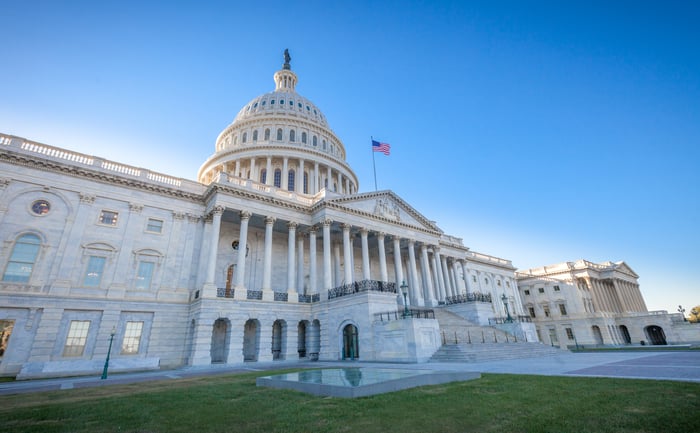Did Congress Borrow Money From Social Security Funds
In case you oasis't heard, America'due south top social program isn't on the all-time financial footing. According to the latest report from the Social Security Board of Trustees, Social Security is staring downward a $13.9 trillion cash shortfall between 2035 and 2093, with the expectation that its $two.9 trillion in asset reserves volition exist completely exhausted in 15 years.
On 1 manus, there is solace in knowing that Social Security isn't going bankrupt, which is a function of two of the program's acquirement sources being recurring (the payroll taxation on earned income and the taxation of benefits). On the other paw, in that location's no sugarcoating the worry that would follow if benefit cuts of upward to 23% are passed along to and so-current and time to come retired workers, as of 2035. Remember, more 3 out of 5 electric current retirees lean on Social Security for at to the lowest degree half of their monthly income.
How did Social Security get into this mess, you ask? That's a source of contentious contend, and it's also a state mine of misinformation.

Epitome source: Getty Images.
Did Congress really raid Social Security?
One of the more than common theories as to why Social Security is facing a huge long-term cash shortfall is that lawmakers in Congress accept pilfered cash from the program and never returned it.
This thought goes all the way back to 1968, when then-President Lyndon B. Johnson made a change to how the federal upkeep would be presented. Prior to 1974, earlier Congress had an contained budgeting procedure, the President'south Commission on Budget Concepts had iii separate budgets, all of which had differing deficits. To simplify things, Johnson called for Social Security and its trust funds to be included in the annual federal budget.
In 1983, the Reagan administration voted to undo this change and once again remove Social Security from the federal budgeting procedure. This was done to ensure that changes fabricated to the program are done solely on the claim of the program, and not to residue the federal upkeep.
Where the thought comes into play that Congress stole from Social Security is, during this 1968 to 1990 menstruum (1990 is when Social Security was completely off-budget again), it's believed that lawmakers commingled Social Security's asset reserves (i.eastward., its amass annual net-cash surpluses built upward since inception) with its Full general Fund to pay for wars and other line items. The conventionalities among some folks is that Congress has stolen trillions of dollars from Social Security, and that if this money were merely returned to the plan, it wouldn't be in such dire financial shape.
But the existent surprise, upon excavation deeper, is that Congress hasn't stolen a dime from Social Security.

Image source: Getty Images.
Hither'south the truth most Social Security's Trust Funds and Congress' "stealing"
There are ii important aspects of the wrong notion that lawmakers stole from Social Security which need to be addressed.
Starting time of all, there's the period between 1968 and 1990, which is believed to be when Congress pilfered America's pinnacle social programme. What needs to be understood here is that, while Social Security'south two trusts (the Old Historic period and Survivors Insurance Trust and Disability Insurance Trust) and its asset reserves were technically "on-upkeep," funding for Social Security and payouts remained entirely split entities from the federal regime'south General Fund. In plainer English language, recall of money within Social Security'south sphere as being completely untouchable past other money in the federal budget. This means at no point over this 22-year period where Social Security was on-budget did a dime of Social Security income, benefits, or nugget reserves become commingled with the federal government's General Fund.
The second thing to realize hither is that Social Security'south asset reserves are required by law to be invested into special-consequence bonds and, to a far lesser extent, certificates of indebtedness. I'thousand going to echo that, in case you were skimming. Social Security $2.9 trillion in net-cash surpluses that have been built up over fourth dimension aren't immune to sit in a bank vault collecting grit. They're required to be invested in bonds by law.
Are these bonds sold by the federal authorities? Yes. Just this doesn't equate to stealing. Rather, the federal government is borrowing capital that would otherwise be losing coin to inflation and paying interest into the Social Security programme on its borrowing. Yes, you lot read that correctly. Not just is every cent the federal government has borrowed from Social Security accounted for, but the authorities is paying interest into Social Security, thereby improving the health of the program. In 2018, $83 billion in interest income was collected by Social Security. If the folks who believe that Congress stole from Social Security got their way, and the federal regime repaid every cent it borrowed, Social Security would take lost out on this $83 billion in interest income in 2018.

Image source: Getty Images.
Want to arraign something? Blame congressional inaction
If you yearn to point the blame for Social Security'due south imminent cash shortfall on Congress, become right ahead. Just make certain you're blaming lawmakers for the correct event.
What Congress hasn't done is steal from Social Security. Yet, lawmakers have known of the plan's shortcomings since 1985, and have yet to find a heart-basis solution to ready it. If you want to indicate the finger at lawmakers, do then considering bountiful solutions exist, merely political hubris appears to be getting in the manner.
As you lot probably know, Democrats and Republicans each accept a primary fix for Social Security that works. Democrats wants to see the payroll tax earnings cap raised or eliminated, which would require the well-to-do to pay more than into the program. Meanwhile, Republicans favor a gradual increase to the full retirement age, which would lead to a reduction in long-term outlays from Social Security. Although both solutions get the job done, neither has the votes to pass in the Senate.
Peradventure even more baffling, the perceived weakness of each solution is perfectly addressed by their opposition. For example, the GOP'south plan to reduce outlays takes decades earlier lower expenditures are realized. This is remedied by the Democrats' plan to immediately heave taxation acquirement. Insufficiently, the Republicans' plan helps to tackle lower birth rates, rising longevity, and lower net-immigration rates that the Democrats' solution fails to account for.
If you want to blame Congress for something, let it exist their lack of action to resolve the program'due south imminent cash shortfall when so many solutions are on the tabular array.
Source: https://www.fool.com/retirement/2020/02/15/the-surprising-amount-of-money-congress-has-stolen.aspx
Posted by: caronrancelf1965.blogspot.com

0 Response to "Did Congress Borrow Money From Social Security Funds"
Post a Comment